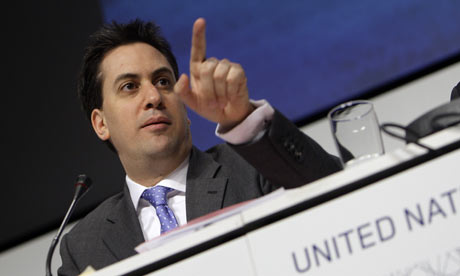
Ed Miliband gestures during a press briefing at the UN climate summit in Copenhagen. Photograph: Anja Niedringhaus/AP
With just two days remaining, the inability to overcome disagreements about the shape of a deal to combat global warming led to hours of inaction today , while outside the negotiations police clashed with protesters who broke through a security cordon but failed in an attempt to storm the conference centre.
"We have made no progress" said a source close to the talks. "What people don't realise is that we are now not really ready for the leaders. These talks are now 18 hours late."
More than 115 world leaders arrive tomorrow and on Friday and had expected only to bargain over the final details in a prepared draft agreement but the earlier impasse could condemn the talks to failure.
For the first time frustrated negotiators spoke openly of – at best – reaching a weak political agreement that would leave no clear way forward to tackle rising greenhouse gas emissions.
That would mean the negotiations staying in limbo well into next year, increasing the damage caused by global warming.
The day saw thousands of protesters take to the streets to demand a strong deal by Friday but, while they clashed with police, they failed in their objective to enter the conference centre.
A key meeting of 25 government ministers from different countries, chosen to streamline the negotiations, was 18 hours behind track tonight , having failed to meet for the entire day. The group, along with another 25 "shadow" ministers, had been scheduled for its first meeting in the early hours of Wednesday but it was delayed. Ministers from developing countries were shocked to find that, instead of making progress on producing the slimmed-down draft agreement for the leaders, talks starting at 5.45am had seen the document increase in complexity.
Miliband said people around the world would be rightly furious if negotiators failed to get a deal because the talks were delayed not over substance, but over the process. "It would be a tragedy if we failed to agree because of the substance. It would be a farce if we failed to reach agreement because of the process," he said.
"People will find it extraordinary that this conference that has been two years in the planning and involves 192 countries, which is such an important thing, such important stakes, is at the moment being stalled on points of order."
There was, however, some progress on other important issues. The US and China appeared to resolve some of their differences and a proposal from the Ethiopian prime minister on climate funding closed the gap between rich and poor countries. At the heart of the impasse is the fate of the Kyoto protocol, signed in 1997. It is the only legally binding agreement on climate change and requires industrialised nations – but not developing nations – to cut their emissions. Rich nations want a fresh treaty, arguing the world has changed and the major emerging economies such and China and India must commit to curbing their huge and fast growing national emissions. But the developing nations argue that rich nations grew wealthy by polluting the atmosphere and must take primary responsibility for it, which can only be guaranteed by Kyoto.
China, India, South Africa and Brazil brought one half of the talks to a halt in expectation that the Danish presidency was going to introduce a new text which would effectively kill Kyoto. "Things are getting held up by procedural wrangling," said Miliband. "People can kill this agreement with process arguments. It will be tragedy if we cannot reach an agreement on substance, but it will be a farce if we cannot agree on process."

No comments:
Post a Comment